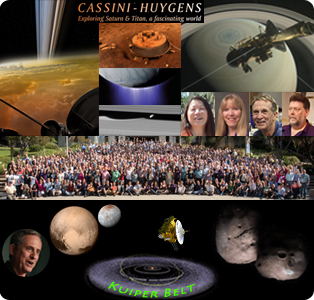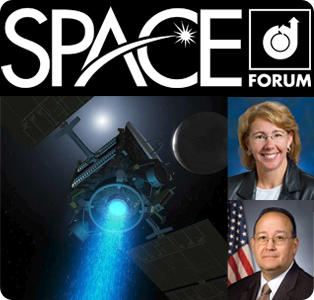Cassini and New Horizons Dive into Next Mission Phases
|
MONDAY Ongoing…
|

![]() = All times
= All times
for terrestrial events in local time unless noted.
![]() = All times for international terrestrial events in local time unless noted.
= All times for international terrestrial events in local time unless noted.
![]() = All times for space events, and…
= All times for space events, and…
![]() = All times for international space / astro events in Hawaii Standard Time unless noted. Add 10 hours to obtain UT (‘Universal Time;’ Greenwich, England).
= All times for international space / astro events in Hawaii Standard Time unless noted. Add 10 hours to obtain UT (‘Universal Time;’ Greenwich, England).
Weekly Planet Watch – Evening Planets: Jupiter (WSW), Saturn (SW), Uranus (E), Neptune (SE); Morning Planets: Mercury (E), Mars (E), Venus (E).
AIAA Space Forum 2017 in Orlando and Florida Space Coast Stand DownForum Cancelled due to Hurricane Irma; Upcoming AIAA activities with IAC in Adelaide September 24-29
American Institute of Aeronautics and Astronautics hosts the AIAA Space Forum September 12-14 at the Hyatt Regency in Orlando, Florida. The extensive program combines technical conference aspects and insights of recognized leaders to provide a integrated platform for navigating important challenges and opportunities in global space policy, capabilities, planning, research and development. Organizing Committee General Chair is Ray Lugo of Florida Space Institute who will also serve as Moderator for the Forum 360 panel discussion on Transformation of the Space Coast. Other 360 sessions include US Launch Vehicles in the 2020s, Commercial Crew Program Update, Global Partnerships and Space Exploration and Innovation, and On-Orbit Servicing, Robotic Assembly, and Manufacturing. An Invited Keynote from James Wertz titled ‘Making $100 billion/year Living and Working on the Moon’ is a feature of the Reinventing Space session on Tuesday. AIAA is the largest technical society dedicated to the global aerospace profession. It claims more than 30,000 individual members from 88 countries, and 95 corporate members. Leadership includes President-elect John Langford and Executive Director Sandra Magnus. (Image Credit: AIAA, Florida Space Institute) |
Continued from…
|
TUESDAY
![]() Sep 12 — OSIRIS-REx Earth Targeting Maneuver: Origins-Spectral Interpretation-Resource Identification-Security-Regolith Explorer (OSIRIS-REx) minor Earth targeting maneuver planned for today before Earth flyby Sept 22, Asteroid 101955 Bennu (1999 RQ36) arrival in October.
Sep 12 — OSIRIS-REx Earth Targeting Maneuver: Origins-Spectral Interpretation-Resource Identification-Security-Regolith Explorer (OSIRIS-REx) minor Earth targeting maneuver planned for today before Earth flyby Sept 22, Asteroid 101955 Bennu (1999 RQ36) arrival in October.
![]() Sep 12 — Roscosmos State Corporation, Launch Soyuz MS-06 / ISS 52S, Baikonur Cosmodrome, Kazakhstan: Expedition 53/54 members Mark Vande Hei and Joe Acaba of NASA and Alexander Misurkin of Roscosmos to launch to ISS.
Sep 12 — Roscosmos State Corporation, Launch Soyuz MS-06 / ISS 52S, Baikonur Cosmodrome, Kazakhstan: Expedition 53/54 members Mark Vande Hei and Joe Acaba of NASA and Alexander Misurkin of Roscosmos to launch to ISS.
![]() Sep 12 — 55th Observation John F. Kennedy Moon Speech & 25th Observation 1st African-American Woman in Space, USA / Worldwide: As the World looks forward to the First Woman on the Moon and a Human Return to Moon, observations made today for 55th anniversary of Kennedy Moon speech (1962) and to celebrate the 25th anniversary of Astronaut Mae Jemison becoming first African-American Woman in Space (1992).
Sep 12 — 55th Observation John F. Kennedy Moon Speech & 25th Observation 1st African-American Woman in Space, USA / Worldwide: As the World looks forward to the First Woman on the Moon and a Human Return to Moon, observations made today for 55th anniversary of Kennedy Moon speech (1962) and to celebrate the 25th anniversary of Astronaut Mae Jemison becoming first African-American Woman in Space (1992).
![]() Sep 12 — Lunar and Planetary Laboratory, university of Arizona, Tucson AZ: Colloquium: Planetesimal Collisions in the Early Solar System – What Can Meteorites Tell Us? by Fred Ciesla, Professor at U. of Chicago.
Sep 12 — Lunar and Planetary Laboratory, university of Arizona, Tucson AZ: Colloquium: Planetesimal Collisions in the Early Solar System – What Can Meteorites Tell Us? by Fred Ciesla, Professor at U. of Chicago.
![]() Sep 12-14 — AIAA, Orlando FL: AIAA SPACE and Astronautics Forum and Exposition (AIAA SPACE 2017); Canceled due to Hurricane Irma.
Sep 12-14 — AIAA, Orlando FL: AIAA SPACE and Astronautics Forum and Exposition (AIAA SPACE 2017); Canceled due to Hurricane Irma.
![]() Sep 12-14 — City of Toronto, TechToronto, MaRS Discovery District, MoveTheDial, OneEleven, Cossette Communications, Toronto, Ontario, Canada: 2017 Elevate Toronto.
Sep 12-14 — City of Toronto, TechToronto, MaRS Discovery District, MoveTheDial, OneEleven, Cossette Communications, Toronto, Ontario, Canada: 2017 Elevate Toronto.
![]() Sep 12 — Moon: 0.44° N of Aldebaran, 02:00; at last quarter, 20:26.
Sep 12 — Moon: 0.44° N of Aldebaran, 02:00; at last quarter, 20:26.
WEDNESDAY
![]() Sep 13 — Sally Ride Science, UCSD, City of San Diego, San Diego CA: Sally Ride Science STEAM Series: Virtual Reality in the Classroom.
Sep 13 — Sally Ride Science, UCSD, City of San Diego, San Diego CA: Sally Ride Science STEAM Series: Virtual Reality in the Classroom.
![]() Sep 13 — PBS Broadcasting, WGBH Boston, Broadcast / Boston MA: Nova: Death Dive to Saturn to premier 21:00 EDT.
Sep 13 — PBS Broadcasting, WGBH Boston, Broadcast / Boston MA: Nova: Death Dive to Saturn to premier 21:00 EDT.
![]() Sep 13-14 — The National Academies of Sciences, Engineering and Medicine, Irvine CA: Committee on Astrobiology and Planetary Science Meeting.
Sep 13-14 — The National Academies of Sciences, Engineering and Medicine, Irvine CA: Committee on Astrobiology and Planetary Science Meeting.
![]() Sep 13-14 — Wuerzburg University, International Academy of Astronautics, bavAIRia e.V., Unisec-Europe, Wurzburg, Germany: 10th Pico- and Nano-Satellite Workshop: Technologies for Small Satellite Research.
Sep 13-14 — Wuerzburg University, International Academy of Astronautics, bavAIRia e.V., Unisec-Europe, Wurzburg, Germany: 10th Pico- and Nano-Satellite Workshop: Technologies for Small Satellite Research.
![]() Sep 13-14 — McGill University, Montreal, Quebec, Canada: Meeting: Canadian Radio Astronomy – Surveying the Present and Shaping the Future.
Sep 13-14 — McGill University, Montreal, Quebec, Canada: Meeting: Canadian Radio Astronomy – Surveying the Present and Shaping the Future.
![]() Sep 13-15 — NASA, Pasadena CA / Online: Cassini End-of-Mission activities and media events; final downlink of images expected to begin streaming online at 17:00.
Sep 13-15 — NASA, Pasadena CA / Online: Cassini End-of-Mission activities and media events; final downlink of images expected to begin streaming online at 17:00.
![]() Sep 13-16 — International Max Planck Research School for Solar System Science, Gottingen, Germany: Conference: Rocks’n’Stars II conference.
Sep 13-16 — International Max Planck Research School for Solar System Science, Gottingen, Germany: Conference: Rocks’n’Stars II conference.
![]() Sep 13 — Moon: Moon at perigee (distance 369,856 km), 06:11; 0.73° N of asteroid 8 Flora, 15:00; 5.0° S of M35 cluster, 16:00.
Sep 13 — Moon: Moon at perigee (distance 369,856 km), 06:11; 0.73° N of asteroid 8 Flora, 15:00; 5.0° S of M35 cluster, 16:00.
THURSDAY
![]() Sep 14 — United Launch Alliance, Launch Atlas 5 / NROL-42, Vandenberg AFB CA: ULA Atlas 5 rocket, designated AV-072, to launch classified spacecraft payload for the U.S. National Reconnaissance Office.
Sep 14 — United Launch Alliance, Launch Atlas 5 / NROL-42, Vandenberg AFB CA: ULA Atlas 5 rocket, designated AV-072, to launch classified spacecraft payload for the U.S. National Reconnaissance Office.
![]() Sep 14-15 — International Max Planck Research School for Solar System Science, Heidelberg, Germany: Workshop on Neutrino, Dark Matter and Beyond the Standard Model Physics (LAUNCH 17).
Sep 14-15 — International Max Planck Research School for Solar System Science, Heidelberg, Germany: Workshop on Neutrino, Dark Matter and Beyond the Standard Model Physics (LAUNCH 17).
![]() Sep 14 — Mercury: 10.9° ESE of Venus, 02:00.
Sep 14 — Mercury: 10.9° ESE of Venus, 02:00.
![]() Sep 14 — Apollo Asteroid 310560 (2001 QL142): Near-Earth Flyby (0.058 AU).
Sep 14 — Apollo Asteroid 310560 (2001 QL142): Near-Earth Flyby (0.058 AU).
FRIDAY
![]() Sep 15 — Cassini, Saturn Orbit: Projected date for end of Cassini-Huygens extended mission with controlled fall into Saturn atmosphere on orbit 293; flyby of Pandora scheduled at 86,000 km, Pan at 91,000 km, Epimetheus at 92,000 km, Janus 111,000 km.
Sep 15 — Cassini, Saturn Orbit: Projected date for end of Cassini-Huygens extended mission with controlled fall into Saturn atmosphere on orbit 293; flyby of Pandora scheduled at 86,000 km, Pan at 91,000 km, Epimetheus at 92,000 km, Janus 111,000 km.
![]() Sep 15 — `Imiloa Astronomy Center, University of Hawai`i – Hilo, Hilo HI: Mauna Kea Skies Talk; astronomers from Mauna Kea observatories speak about recent discoveries; this session features Keck Observatory; 19:00 HST, US$8-10.
Sep 15 — `Imiloa Astronomy Center, University of Hawai`i – Hilo, Hilo HI: Mauna Kea Skies Talk; astronomers from Mauna Kea observatories speak about recent discoveries; this session features Keck Observatory; 19:00 HST, US$8-10.
![]() Sep 15-16 — OECT Organizing Committee, Tokyo University of Technology, Osaka University, Beijing, China: 2017 International Conference on Optics, Electronics and Communications Technology (OECT2017).
Sep 15-16 — OECT Organizing Committee, Tokyo University of Technology, Osaka University, Beijing, China: 2017 International Conference on Optics, Electronics and Communications Technology (OECT2017).
![]() Sep 15-17 — Calgary Centre of the Royal Astronomical Society of Canada, Starland, Alberta, Canada: 31st Alberta Star Party.
Sep 15-17 — Calgary Centre of the Royal Astronomical Society of Canada, Starland, Alberta, Canada: 31st Alberta Star Party.
![]() Sep 15 — Moon: 13.0° S of Castor, 01:00; 9.3° S of Pollux, 05:00; 2.8° S of Beehive Cluster, 05:00.
Sep 15 — Moon: 13.0° S of Castor, 01:00; 9.3° S of Pollux, 05:00; 2.8° S of Beehive Cluster, 05:00.
![]() Sep 15 — Mercury: At perihelion (distance 0.3075 AU from the Sun), 02:00.
Sep 15 — Mercury: At perihelion (distance 0.3075 AU from the Sun), 02:00.
SATURDAY
![]() Sep 16-17 — Unique Conferences Canada, International Center for Research & Development, University of Toronto, Toronto, Ontario, Canada: 6th International Conference on Climate Change Adaptation.
Sep 16-17 — Unique Conferences Canada, International Center for Research & Development, University of Toronto, Toronto, Ontario, Canada: 6th International Conference on Climate Change Adaptation.
![]() Sep 16 — Mercury: 0.06° NNE of Mar, 09:00.
Sep 16 — Mercury: 0.06° NNE of Mar, 09:00.
![]() Sep 16 — Aten Asteroid 2014 RX22: Near-Earth Flyby (0.080 AU).
Sep 16 — Aten Asteroid 2014 RX22: Near-Earth Flyby (0.080 AU).
SUNDAY
![]() Sep 17-21 — Center for Fundamental Physics at Zewail City of Science and Technology, Hurghada, Egypt: Conference: Beyond Standard Model – From Theory To Experiment (BSM2017).
Sep 17-21 — Center for Fundamental Physics at Zewail City of Science and Technology, Hurghada, Egypt: Conference: Beyond Standard Model – From Theory To Experiment (BSM2017).
![]() Sep 17-22 — European Planetary Science Congress, Aberystwyth University, INAF – IAPS, Riga, Latvia: European Planetary Science Congress 2017.
Sep 17-22 — European Planetary Science Congress, Aberystwyth University, INAF – IAPS, Riga, Latvia: European Planetary Science Congress 2017.
![]() Sep 17 — Moon: 0.53° SSW of Venus, 15:00; 0.14° NW of Regulus, 19:00; with Venus and Regulus within circle of diameter 2.36° and 26° W of Sun, 19:00.
Sep 17 — Moon: 0.53° SSW of Venus, 15:00; 0.14° NW of Regulus, 19:00; with Venus and Regulus within circle of diameter 2.36° and 26° W of Sun, 19:00.

